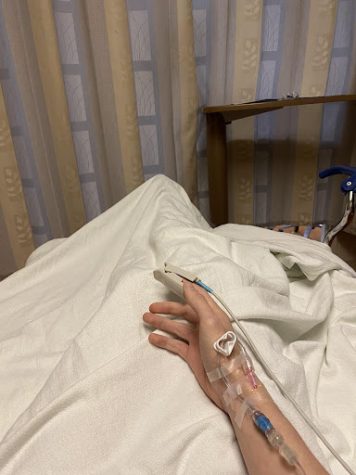Post-surgery road to recovery
January 10, 2023

“Under the knife” is a phrase that refers to an event that not many have experienced. It refers to the act of surgery, and for me, the act of surgery brings about unpleasant thoughts and feelings. I happened to be in a place where I had to experience this event, and in my particular case, it was knee surgery. This was my second arthroscopic knee surgery in a matter of five months and I had the same greuling procedure done on both of my knees. The main reasons I needed the procedures were the result of several knee dislocations and my legs not growing straight.
In my experience, surgery might not actually be the worst part, the anticipation is. When people ask me, “How are you feeling?” it puts me in a weird situation as I haven’t yet had the surgery. I understand that they want to check on how I am doing mentally, so I usually say, “As good as I can be.” The mental pressure of the anticipation of the long and strenuous recovery also affected me before the surgery as I often lost focus and was less attentive and unmotivated. This was an issue at the end of the marking period. I had to find many different ways to relieve the stress by finding new hobbies and, rather unfortunately, ignoring some assignments. The anxiety and anticipation caused a domino effect that impacted me in more ways than some people may have realized. Ever since 2019, when I first dislocated my knee, I lost confidence in my ability to keep them healthy, and that resulted in my decision to cave to having these operations.
I feel lucky to live in a day and age that the surgery itself is possible, as not too long ago it wasn’t, but thanks to modern technology, it was for me. To fix my knees, the doctors had to take a CT scan of my leg and use CAD programs to construct a plate that directly suited my specific bone structure. This went into my femur to straighten my leg. They connected that with eight screws, and because my kneecap still moved around, they added an extra ligament for extra protection. The recovery from this was more complicated because it was a bone operation. I could not put full weight onto that leg for six whole weeks. Six. Whole. Weeks. The countdown to the end, day after day, felt like the longest six weeks ever. People constantly ask, “How much longer until you can walk?” I know how much longer, but the toll has already been taken.
Waking up in the post-operative room was one of the most mystifying experiences not only of the entire recovery process but also of my entire life. I woke up, not knowing where I was, not knowing how I got there, not knowing what had taken place, and not knowing how some massive leg brace got put on. I was heavily sedated and the beeps from the heart rate monitor pierced through the cold and uninviting room. After some time had elapsed, I’m not sure how much time, as I was not even close to being coherent, my nurse would ask, “How are you feeling?” and “Can I get you something to eat, or drink?” After she listed off the short list of items, I ordered some graham crackers and some apple juice. I then, still under anesthesia, fell back asleep and woke up in another room, with a similar reaction. There was a Michigan State basketball game on the TV, so I watched that, ate the crackers, drank the juice, and shortly after that, the nurse brought me in a wheelchair. I lumbered onto it, I was wheeled out to my car, loaded into the back seat, and went home. Aside from everything else, the car ride was also very disorienting, as I felt sleepy, confused, and dazed while trees and cars whizzed by as I attempted to stay awake until I made it home safely.
There were countless times in which I would say, “This is the worst part” and then not long after, I would find a new worst part over and over again. In the end, that’s the reason why I did the surgery. Not for the pain, not to skip school, not to sit on the couch and watch lots of TV, even though that may be an upside. I do it for my future self because I don’t want further knee issues later in life, with more major injuries that could have been prevented by these operations.
The recovery itself is the process in which the most pain is inflicted, and the most dreadful part of the entire experience. One small slip can cause a world of hurt that I loathe experiencing. It took a toll not only on the leg I got operated on but on everything else. The loss of stamina, the lack of muscle, the restless nights. All that punishment comes as a result of the drugs, pain, and anxiety from the operation. Too often I found myself lying alone, at night, wondering where it all went wrong with my knees and wondering why my dad snores so much. But I can’t help but wonder at the technological amazement that caused the procedure to happen, and to thank my doctor, who has been with me since my first knee dislocation back almost three years now, for the gift he has given me and the ability to have freedom with my legs.











